Get Me Out of Here
Get Me Out of Here
My Recovery from Borderline Personality Disorder
RACHEL REILAND
 HAZELDEN
HAZELDEN
Hazelden
Center City, Minnesota 55012-0176
1-800-328-0094
1-651-213-4590 (Fax)
www.hazelden.org
2004 by Rachel Reiland
First published by Eggshells Press, 2002
(Original edition titled I'm Not Supposed to Be Here )
First published by Hazelden, 2004. All rights reserved
Printed in the United States of America
No portion of this publication may be reproduced in any manner without
the written permission of the publisher.
Library of Congress Cataloging-in-Publication Data
Reiland, Rachel.
[I'm not supposed to be here]
Get me out of here : my recovery from borderline personality disorder / Rachel Reiland.
p. cm.
Previously published: I'm not supposed to be here. Minnesota : Eggshells Press, 2002.
ISBN 1-59285-099-5
Ebook ISBN: 978-1-59285-777-7
1. Reiland, RachelMental health. 2. Borderline personality disorderPatientsUnited StatesBiography. 3. Borderline personality disorderTreatment. I. Title.
RC569.5.B67R45 2004
616.85'852'0092dc22
[B]
2004047373
Editor's note
This publication is designed to provide accurate information in regard to the subject matter covered. It is sold with the understanding that the publisher and author are not engaged in rendering psychological, financial, legal, or other professional services. If expert counseling is needed, the services of a competent professional should be sought.
To protect the anonymity of the author, her family, her friends, and the many professionals who helped the author through the therapeutic process, pseudonymous names have been used to represent all people, locations, and institutions described in this book.
08 07 06 05 04 6 5 4 3 2 1
Cover design by David Spohn
Typesetting by Tursso Companies
Note from Original Publisher
Dear Readers:
Seven years ago, I met Rachel Reiland on my Welcome to Oz Internet Listserv support group for people with borderline partners.
The members of my group were living in the midst of a capricious tornado: alternately confused, terrorized, and hopeless. Then Rachel stepped in.
Recovered from her illnessan incredible accomplishmentshe explained to members what probably lay behind their partners' illogical behavior. She revealed the inner terror she experienced as a borderline, enabling them to see beyond their partners' controlling and abusive behavior.
And because she was recovered, she gave them hope.
When she showed me her first draft of this book, I was awed by her courageous escape from the prison of her own mind. And as an author and writer, I was taken away by the raw power of her writing style. She survived; then she wrote about it with a profundity that made her story unforgettable.
Though I was working on my own publications, I made it my mission to ensure that Rachel's story be heard by the entire community of individuals and clinicians interested in borderline personality disorder (BPD). I knew that the book would take readers on a journey of understanding of what it's like to have BPD, give new hope to the borderline community, and help erase the myth that borderlines never get better.
With the support of others eager to tell Rachel's story to the world, I published this book with my own imprint, Eggshells Press. Hazelden Publishing and Educational Services then bought the publishing rights to bring this book to a larger audience.
Whether your life has been touched by borderline personality disorder or not, Rachel's journey through mental illness is fascinating and cathartic. It shows that fundamental change is possible if we have the courage to face our own demons, look them in the eye, and banish them from our self-perception. It doesn't matter what we have to overcome: BPD, anorexia, or some other mental illness. The point is that with help and a commitment to recovery and healing, we can overcome it and heal our emotional and spiritual wounds.
In a way, this book is a love story: a mother's love for her children, her husband, her psychiatrist, and, ultimately, for herself. My hope for you, the reader, is that this book impacts your emotions, gives you the experience of what it's like to have BPD, and shows you that if a person is committed to recovery, recovery is possible.
I hope you find it as richly rewarding and life changing as I have. And may it give you a better understanding of how it feels to not just be symptom-free, but to live with contentment, self-love, and true joy.
Randi Kreger
Coauthor, Stop Walking on Eggshells and The Stop
Walking on Eggshells Workbook ; Owner,
www.bpdcentral.com and the Welcome to Oz family of
thirty-five Listserv support groups for family members of people with a borderline in their lives
Foreword
Rachel Reiland's courageous struggle with borderline personality disorder (BPD) is a tale that is both harrowing and reassuring, disturbing but sustaining. Her battle is typical yet unique. These paradoxes are like the illness itself. BPD is a disorder characterized by contradictions. Its cure is derived by navigating through the straits of emotional extremes into the tranquil waters of compromise and consolidation.
Get Me Out of Here details Reiland's recovery. Her triumph results from the collaboration with her talented and unconditionally accepting psychiatrist. In the doctor, she found compromise between her desperate childhood fears of abandonment and her adult-derived defenses of self-destructiveness, attacking rage, and nihilism. From the remnants of her frightened, vulnerable childhood (which she labeled Vulno) and her Tough Chick personae, Reiland fashioned her individual humanity.
Some of this story is typical: early family conflicts, abusive relationships, feelings of insecurity contributing to destructive behaviors such as rage attacks, promiscuity, and anorexia. The extreme behaviors of BPD constitute the high drama in the stories of those who endure its ravages. But Reiland does not focus only on the flamboyance of the symptoms. She also describes the small, intimate nicks and cuts that bleed slowly and painfully, day to day.
Reiland's recovery is, in many ways, atypical. It is attained through an intensive, four-year course of traditional, psychoanalytically oriented psychotherapy, punctuated by several hospitalizations, some lasting for several weeks. Unfortunately, such a treatment program would be unavailable to most patients today. Most hospital psychiatric units are not geared for extended stays of more than a few days, and most insurance will not support this intensive treatment regimen.
Fortunately, Reiland possessed financial support to pay for her care. She also maintained a supportive, loving relationship with her husband and children. And she developed a trusting relationship with an experienced, knowledgeable psychiatrist. Although many sufferers may not share all of these blessings, they can, nevertheless, still achieve the victories she accomplished through the same persistence and courage she demonstrated.
BPD is the monstrous, metastatic malignancy of psychiatry. Most professionals shun patients with this diagnosis, convinced that they are exhausting, hopeless, and often terminal. The sickest, most severely psychotic schizophrenic patient is preferred over one with BPD, because at least there is some feeling of control over the treatment process. Hospitalization and medication can easily and quickly subdue the schizophrenia monster. But BPD symptoms can rage unpredictably, are difficult to control, require months or years to detect improvement, and can overwhelm the vulnerable therapist.
Next page
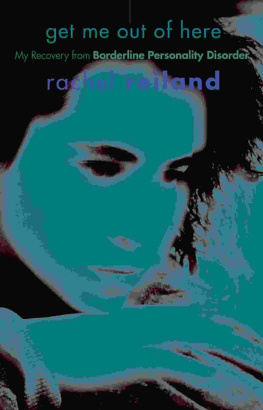
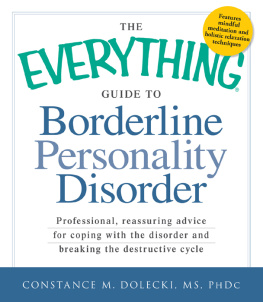

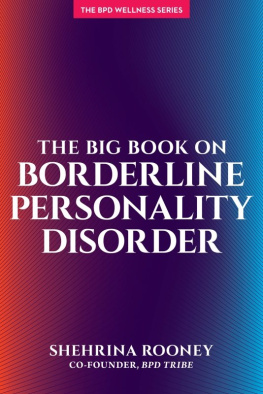

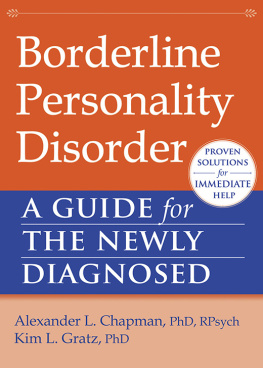
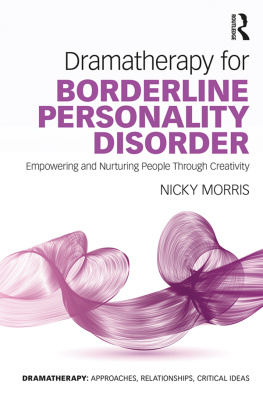

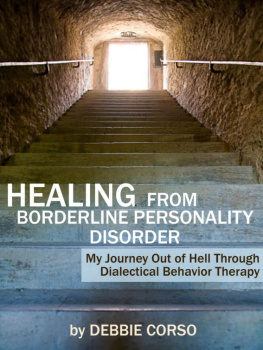
 HAZELDEN
HAZELDEN